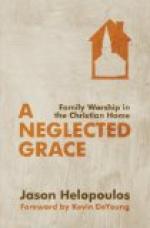Having considered some of the false standards of judgment in the choice of a companion for life, we now revert to those true tests which are given us in the Word of God. There we have the institution and true idea of marriage, and the principles upon which we should proceed in making the marriage choice.
We are taught in the holy scriptures, the primary importance of judicious views of the nature and responsibilities of the marriage institution itself. We should apprehend it, not from its mere worldly standpoint, not as a simple legal alliance, not only as a scheme for temporal welfare and happiness, but as a divine institute, a religious alliance, involving moral responsibilities, and momentous consequences for eternity as well as for time, for soul as well as for body. We are commanded to look to its religious elements and duties; and to regard it with that solemnity of feeling which it truly demands. When the light of the bridal day throws upon the cheek its brightest colors, even then we should rejoice with trembling, and our joy and festivity should be only in the Lord.
“Joy,
serious and sublime,
Such as doth nerve the energies of prayer,
Should swell the bosom, when a maiden’s
hand,
Filled with life’s dewy flowerets,
girdeth on
That harness which the ministry of death
Alone unlooseth, but whose fearful power
May stamp the sentence of eternity.”
In the days of our forefathers, marriage was thus held sacred, as a divine institution, involving moral and religious duties and responsibilities; and their celebration of it was, therefore, a religious one. They realized its momentous import, and its bearing upon their future welfare. It was not, therefore, without heavings of deep moral emotion and the flow of tears as well as of joyful spirits, that they put the wedding garment on.
“There are smiles and tears in that
gathering band,
Where the heart is pledged with the trembling
hand
What trying thoughts in the bosom swell,
As the bride bids parents and home farewell!
Kneel down by the side of the tearful
fair,
And strengthen the perilous hour with
prayer!”
True love in each, and reciprocated by each, must determine the marriage choice. The marriage of children should not be forced. Mutual love is the basis of a proper union, because marriage is a voluntary compact. When parents, therefore, force their children into an alliance, they usurp their undoubted natural and religious rights. Hence there should be no must, where there is no will, on the part of the child. That choice which is made upon any other than reciprocated affection, is an unreasonable and irreligious one. “Parents have no right,” says Paley, “to urge their children upon marriage to which they are averse;” “add to this,” says he, “that compulsion in marriage necessarily leads to prevarication; as the reluctant party promises an affection, which neither exists, nor is expected to take place.” To proceed to marriage, therefore in the face of absolute dislike and revulsion, is irrational and sinful.




